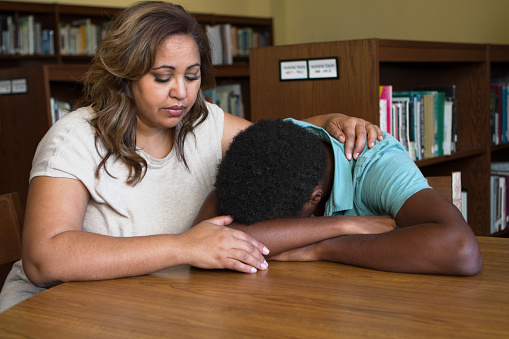The transition to middle school went well for “Jonah,” a bright, social 13-year-old who did well in school in spite of a mild learning disability. But everything changed at the start of 7th grade.
“Nothing’s fun anymore,” he told his mom. “I just feel sad.”
At first, Jonah’s parents chalked his feelings up to typical teen moodiness. But as his mood darkened over the next month, and he began struggling with schoolwork and seeing friends less, they grew concerned.
“I’m so unhappy, and I feel like I’m going to feel this way for the rest of my life,” he said one night. “I know I will.”
More than the blues
Jonah was experiencing depression, a common yet treatable mental health disorder. While every teen feels upset or irritable now and then, depression is a more intense feeling of sadness, hopelessness or anger that lasts for weeks or longer and impairs the teen’s ability to function. Left untreated, depression can lead to academic problems, alcohol and drug abuse, and even suicide.
Depression touches people of all ages, but teens are especially vulnerable, with 12.5 percent experiencing at least one major depressive episode in 2015. Depression can be triggered by stressful events such as changing schools, losing someone close, going through a family divorce, or questioning sexual orientation or gender identity. Adverse childhood experiences such as abuse, neglect and poverty are associated with an increased risk for mental health conditions and self-harm attempts. A family history of depression may increase a teen’s risk.
Reading between the lines
While Jonah expressed his feelings of depression to his parents, many teens can’t or won’t.
“Adolescents have a harder time talking about feelings, so instead of telling us that they’re feeling bad, they might show us with changes in their behavior,” said Anabel Castrezana, a licensed marriage and family therapist at Kaiser Permanente’s Santa Ana Medical Offices.
These behaviors might include:
- restlessness and agitation
- acting out
- lack of enthusiasm, energy or motivation
- forgetfulness and lack of concentration
- withdrawing from friends and activities
- dropping grades or frequent school absences
- changes in eating or sleeping patterns
- frequent headaches and body aches
- substance abuse
- self-harm
How parents and teachers can help
The presence of a caring adult can make a big difference for a teen who is struggling. If you suspect that a young person you are close to is depressed, share your concerns and try to start a conversation. Ask about his or her feelings and challenges at home, at school or with friends. Do your best to listen without being judgmental or reactive, and avoid lecturing. Instead, show the teen you empathize and are there to help.
Before reaching out to a child’s parent to share your concerns, consider whether the teen’s depression may be related to a situation at home. “If the teen is feeling depressed because he or she is being abused, or because mom or dad is drinking or doing drugs, then approaching the parent could make the situation worse by causing retaliation,” said Castrezana. If you have reason to suspect abuse, share your concerns with a school psychologist or counselor, or contact Child Protective Services in your area.

Treatment options
While teens may try to minimize what they are going through, it’s essential that a young person who is suffering from depression gets treatment. Otherwise, the condition can become life-threatening.
“If the teen is telling you that everything is okay, but your gut is that it’s not, you need to go with your instincts,” said Castrezana.
Treatment options include talk therapy (including individual, group or family counseling), medication or a combination of both. With the right treatment, 80 percent of people who suffer from depression can feel better, sometimes within weeks.
Because of the stigma associated with mental illness, many teens and their families are reluctant to seek help. To help reduce that stigma, Kaiser Permanente launched the Find Your Words public health awareness campaign in 2016. The campaign includes TV and radio spots and a website that invites visitors to engage in an interactive conversation about mental health and wellness.
For Jonah, a combination of antidepressant medication and regular check-ins with a therapist eased his depression symptoms and helped him cope with the academic and social pressures of middle school.
“I feel more like myself again,” he said.



